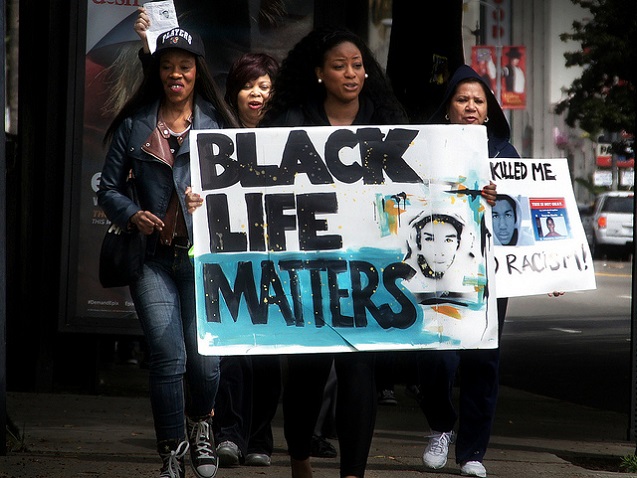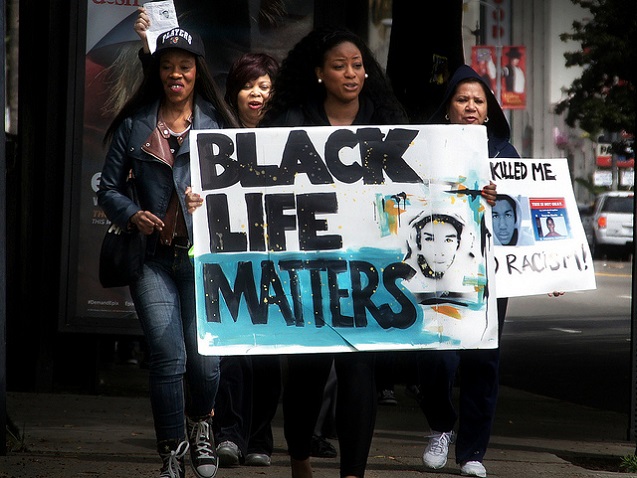
Honest, paywall-free news is rare. Please support our boldly independent journalism with a donation of any size.
 Greg Lilly Photos / Flickr)” width=”637″ height=”478″ />Trayvon Martin Rally in Hollywood. (Photo: Greg Lilly Photos / Flickr)
Greg Lilly Photos / Flickr)” width=”637″ height=”478″ />Trayvon Martin Rally in Hollywood. (Photo: Greg Lilly Photos / Flickr)
Black and brown people deserve the right to LIFE, liberty and the ability to pursue happiness. Black and brown people deserve the right to access quality food. Those rights are connected.
Last week, thousands of people marched the streets all over the country for Trayvon Martin, after the teen’s murderer was acquitted, in part, because of racist imagery painted on Trayvon, making this dead young black male guilty of his own murder. People all over took to the streets in outrage afterward, calling forth the question of the worth of black bodies and the need to challenge the assumed criminality of blackness. It just wasn’t fair that the person who was murdered was assumed guilty and more on trial than his “innocent” killer, who supposedly feared for his life.
The assumed criminality of blackness is a major issue and enforced in myriad ways by media, police, judges, prosecutors and the lack of resources to prove innocence. Racist imagery and assumptions not only instigate shortened life spans for young black and brown bodies, they also underlie harmful public policies that lend to the creation and maintenance of a permanent underclass in this country.
Take for example, an amendment to the farm bill recently passed through the US Senate. In May of this year, Senator David Vitter of Louisiana added a vicious amendment to the farm bill, one of the largest pieces of legislation affecting our ability to access food. In addition to a devastating $4 billion cut to food stamps in the farm bill, the US Senate passed Sen. Vitter’s amendment barring anyone convicted of a violent crime from ever being allowed to access SNAP (food stamps) ever again. Ever.
Whether they’ve served their time already is insignificant. Whether they’ve perhaps been wrongfully incarcerated is also insignificant. What is significant is that a large portion of people whose lives have surely been devastated already by the criminal legal system will have yet one more obstacle to having a fair chance to even survive in this country.
What’s most disturbing is there was virtually ZERO public outcry. This highly racialized piece of legislation, as most of the lives affected are black and brown, had very few voices publicly speaking out against it (except for the Center on Budget and Policy Priorities).
Before I continue, let me be clear. I am in no way conflating murderers and rapists with black and brown people. Black and brown people, as we hopefully know, do not commit murder or sexual violence any more than white people. But the fact is they certainly are policed, profiled and convicted (guilty or not) at a much higher rate than whites. Black and brown defendants are much less likely to have access to adequate resources to defend their cases, are assumed criminals far more and thus are less likely to have a real shot at being fairly tried.
I know first-hand that black and brown people are far more likely to be overly policed, wrongfully convicted, and incessantly assumed guilty. I come from the Chicagoland area where Police Commissioner Jon Burge was proven to have tortured hundreds of black men and women into false confessions.
I now live in a city where five young men of color, who became known as the Central Park 5, were ruthlessly manipulated into false confessions; serving time for raping a white woman they had never seen and later proven to be innocent.
I live in a land where black and brown young men and women are assumed dangerous and thus murdered based on assumptions and dangerous stereotypes. Oscar Grant was murdered in an Oakland subway station by police. He had no weapon, yet was assumed dangerous. Trayvon Martin was a black teenager murdered by a vigilante assuming he was dangerous. As we know, he was only carrying a bag of skittles and ice tea. Jordan Davis was also murdered by a vigilante claiming he feared for his life. Jordan also had no weapon. Rekia Boyd was murdered by an off-duty police officer in Chicago. No weapon, she was having a good time with her friends. In all cases, these black youth (and too many others) were assumed to be guilty or dangerous. But they weren’t.
I am not saying black and brown people don’t commit crimes. I am saying, however, that the fear, and thus the hypercriminalization of black and brown bodies should elicit significant PAUSE as we allow the criminal legal system, with all of its flaws, to inform who should and should not be allowed their human right to access food. Just because a person is convicted does NOT automatically mean they are guilty.
And for those who are indeed guilty, should they be forced to pay for crimes for the rest of their lives? Those with enough privilege to not have their lives (or their loved ones’ lives) entangled with this criminal legal system may find it easy to exclude people who have been “convicted” from accessing their basic right to access food (and housing and employment). Those of us who know better should be outraged.
Federal nutrition programs such as SNAP are critical in helping to eradicate widespread hunger in the United States, but the direction this bill takes under the Senate version states that those “criminals” deserve to pay for a crime for the rest of their lives – even after already serving their time in prison – and starve. These are not faceless, invisible monsters. These are human beings. These are people – our people.
So as we continue to march against injustice, let us raise our voices and oppose discriminatory public policies that instigate inequality (such as Sen. Vitter’s outrageous farm bill amendment and any cuts to food stamps) in addition to those that instigate (or justify) racist vigilantism (such as the “Stand Your Ground” law).
Let the real crimes of hunger, disenfranchisement and discrimination be attacked through policy. And let blackness and browness be as beautiful as it deserves to be without incessant racist assaults of assumed criminality.
Media that fights fascism
Truthout is funded almost entirely by readers — that’s why we can speak truth to power and cut against the mainstream narrative. But independent journalists at Truthout face mounting political repression under Trump.
We rely on your support to survive McCarthyist censorship. Please make a tax-deductible one-time or monthly donation.